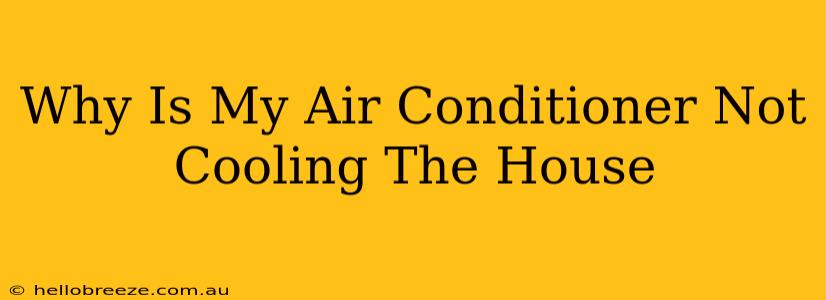Is your air conditioner failing to beat the heat? A malfunctioning AC unit can be incredibly frustrating, leaving you sweltering in discomfort. This guide will troubleshoot common reasons why your AC isn't cooling your house effectively, helping you identify the problem and potentially saving you a costly service call.
Common Reasons Your AC Isn't Cooling
Several factors can contribute to a poorly performing air conditioner. Let's explore some of the most frequent culprits:
1. Dirty Air Filter: A Simple Fix for a Big Problem
This is the most common and easiest problem to fix. A clogged air filter restricts airflow, forcing your AC to work harder and less efficiently. A dirty filter can significantly reduce cooling power and even lead to premature system failure.
Solution: Check your air filter (usually located on the return air vent). If it's dusty or dirty, replace it with a new one. Regularly changing your air filter (every 1-3 months, depending on usage and filter type) is crucial for maintaining efficient AC performance.
2. Refrigerant Leaks: A Serious Issue Requiring Professional Help
Refrigerant is the substance that absorbs heat from your home. A leak in the refrigerant lines means your AC won't have enough coolant to do its job effectively. You should never attempt to handle refrigerant yourself, as it's under high pressure and can be dangerous.
Solution: If you suspect a refrigerant leak, contact a qualified HVAC technician immediately. They have the tools and expertise to detect and repair the leak safely.
3. Frozen Evaporator Coil: A Sign of Restricted Airflow
A frozen evaporator coil prevents proper heat exchange, leading to poor cooling. This is often caused by restricted airflow due to a dirty air filter (see point 1), clogged vents, or a frozen drain line.
Solution: Address any airflow restrictions. If the coil remains frozen, call a qualified HVAC technician. Attempting to defrost it yourself can damage your unit.
4. Faulty Blower Motor or Capacitor: Underlying Mechanical Issues
The blower motor circulates air throughout your home. A malfunctioning motor or capacitor (which powers the motor) will drastically reduce or eliminate airflow, rendering your AC ineffective.
Solution: This is a more complex issue requiring professional diagnosis and repair. Contact a qualified HVAC technician to assess and replace any faulty components.
5. Thermostat Troubles: Incorrect Settings or Malfunctioning Unit
An improperly set or malfunctioning thermostat can prevent your AC from working correctly. Check to ensure your thermostat is set to "cool," the temperature is appropriately low, and the fan is set to "auto" (not "on").
Solution: Try changing the batteries in your thermostat. If the problem persists, you may need to replace the thermostat itself or call an HVAC professional for further assistance.
6. Dirty Condenser Coils: Exterior Unit Maintenance
The condenser coils, located outside your home, release heat. If they are covered in dirt, leaves, or debris, they can't dissipate heat efficiently, leading to poor cooling.
Solution: Regularly clean your condenser coils using a garden hose and a coil cleaning brush. However, be cautious and ensure the unit is turned off and unplugged before attempting this.
Preventative Maintenance for Optimal Cooling
Regular maintenance is key to keeping your AC running smoothly and efficiently. Consider scheduling annual professional maintenance checks to prevent major issues and ensure your system's longevity. This proactive approach can save you money in the long run and prevent unexpected breakdowns during the hottest months.
By addressing these common problems, you can significantly improve your AC's cooling performance and enjoy a comfortable home all summer long. Remember, if you're unsure about any repair, it's always best to consult a qualified HVAC technician.

